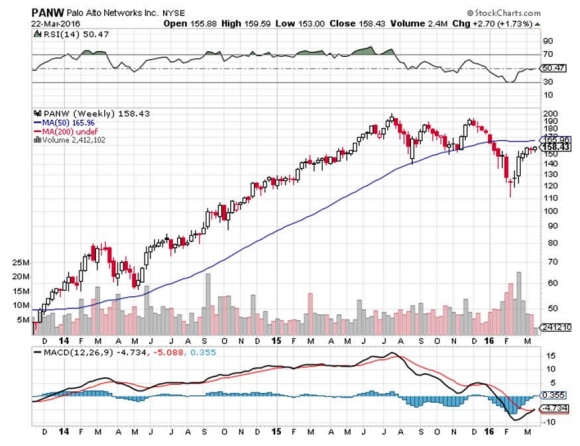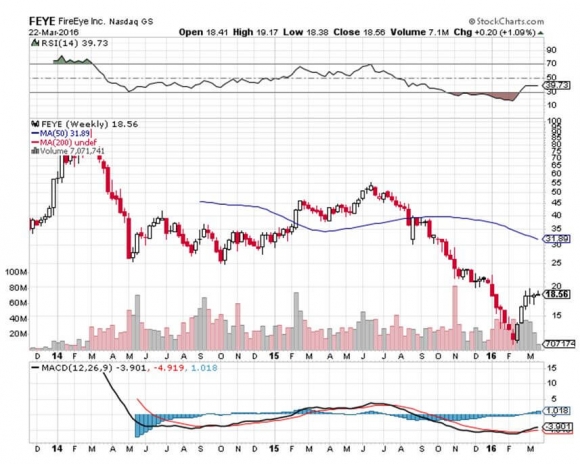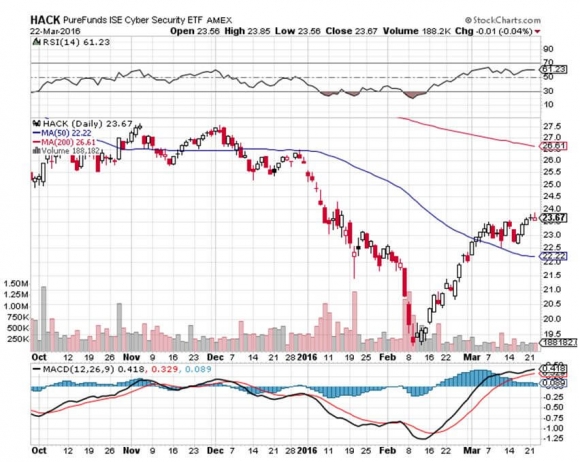Cyber Security Is Only Just Getting Started
It looks like the cyber security sector is about to take off like a rocket once again. There could be another 25%-50% in it this year.
The near destruction of Sony (SNE) by North Korean hackers last November has certainly put the fear of God into corporate America. Apparently, they have no sense of humor whatsoever north of the 38th parallel.
As a result, there is a generational upgrade in cyber security underway, with many potential targets boosting spending by multiples.
It’s not often that I get a stock recommendation from an army general. That is exactly what happened the other day when I was speaking to a three star about the long-term implications of the Iran peace deal.
He argued persuasively that the world will probably never again see large-scale armies fielded by major industrial nations. Wars of the future will be fought online, as they have been, silently and invisibly, over the past 15 years.
All of those trillions of dollars spent on big ticket, heavy metal weapons systems are pure pork designed by politicians to buy voters in marginal swing states.
The money would be far better spent where it is most needed, on the cyber warfare front. Needless to say, my friend shall remain anonymous.
The problem is that when wars become cheaper, you fight more of them, as is the case with online combat.
You probably don’t know this, but during the Bush administration, the Chinese military downloaded the entire contents of the Pentagon’s mainframe computers at least seven times.
This was a neat trick because these computers were in stand alone, siloed, electromagnetically shielded facilities not connected to the Internet in any way.
In the process, they obtained the designs of all of out most advanced weapons systems, including our best nukes. What have they done with this top-secret information?
Absolutely nothing.
Like many in senior levels of the US military, the Chinese have concluded that these weapons are a useless waste of valuable resources. Far better value for money are more hackers, coders and servers, which the Chinese have pursued with a vengeance.
You have seen this in the substantial tightening up of the Chinese Internet through the deployment of the Great Firewall, which blocks local access to most foreign websites.
Try sending an email to someone in the middle Kingdom with a gmail address. It is almost impossible. This is why Google (GOOG) closed their offices there years ago.
I know about these things because several Chinese readers are complaining that they are unable to open my Trade Alerts, or access their foreign online brokerage accounts.
As a member of the Joint Chiefs of Staff recently told me, “The greatest threat to national defense is wasting money on national defense.”
Although my brass-hatted friend didn’t mention the company by name, the implication is that I need to go out and buy Palo Alto Networks (PANW) right now.
Palo Alto Networks, Inc. is an American network security company based in Santa Clara, California just across the water from my Bay Area office. The company’s core products are advanced firewalls designed to provide network security, visibility and granular control of network activity based on application, user, and content identification.
Palo Alto Networks competes in the unified threat management and network security industry against Cisco (CSCO), FireEye (FEYE), Fortinet (FTNT), Check Point (CHKP), Juniper Networks (JNPR), and Cyberoam, among others.
The really interesting thing about this industry is that there are no real losers. That’s because companies are taking a layered approach to cyber security, parceling out contracts to many of the leading firms at once, looking to hedge their bets.
To say that top management has no idea what these products really do would be a huge understatement. Therefore, they buy all of them.
This makes a basket approach to the industry more feasible than usual. You can do this through buying the $435 million capitalized PureFunds ISE Cyber Security ETF (HACK), which boasts Cyberark Software (CYBR), Infoblox (BLOX) and FireEye (FEYE) as its three largest positions. HACK has been a hedge fund favorite since the Sony attack.
For more information about (HACK), please click here.
And don’t forget to change your password.





Disclosures: The Diary of a Mad Hedge Fund Trader, ...
more



So yes you are probably right in some respects that cyber warfare and computer hacking will continue to be a major cause of concern in the US and throughout the world, but my question is; are the big players in the cyber threat defense field able to adequately provide a safe and effective protection against such threats. There is very little reason to invest the HACK ETF if few if any of the companies in its holdings have a proven track history and even with one, how long before the hackers outsmart the good guys? What kind of vulnerability did Sony have that left it so vulnerable? And even with software protection and security safeguards are there any 100% guaranteed ways to protect corporate America or the Government from the next major hack. What happens when all the banks get shut down by a gigantic cyber attack, I shudder to think. Is the entire internet vulnerable to a mega attack? If you watched any of the show "24" you can only hope that our computer run nuclear power plants and weapons are better protected than Sony was! But yes, if it makes you feel better, invest in a cyber security ETF :>